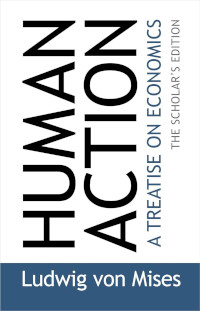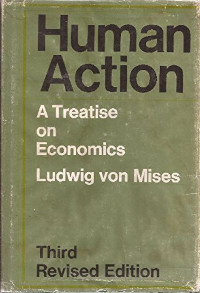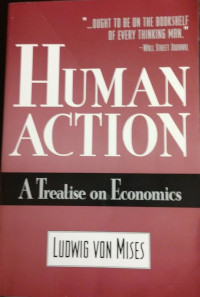Review from LaissezFaireBooks.com, by Roy A. Childs, Jr., June 1990:
This is a cause for celebration!
For several years, Laissez Faire Books has been attempting to arrange for a paperback edition of Ludwig von Mises's masterpiece, Human Action. Human Action was first published in 1949 (a German-language edition, Nationaloekonomie, was published in 1940, then completely rewritten in English), no paperback edition has ever been permitted by its publishers. Now, after literally years of negotiations, we are proud to announce the first paperback edition, thus potentially making it available to a much wider audience.
Its Place in History
Why is Human Action so important? Why has it been revered and honored ever since it was first published? Why is it regarded both as an historic classic and a contemporary masterpiece, by virtually every friend of liberty who has read it? To answer these questions is to understand the special place in history of Ludwig von Mises, and the special place in the body of his works of this truly magnificent achievement.
Our century has properly been called the Era of Statism. In our time, every known form of statism has been tried, from Communism to Fabian Socialism to Fascism, military dictatorships, neomercantilist states, revived monarchies, theocracies, national socialism, and the welfare state—you name it. That's because by the turn of the century, Classical Liberalism—with its advocacy of individualism, private property, laissez faire capitalism, free trade, and limited government—had been soundly defeated by its numerous adversaries. By the eve of the first World War, scarcely a single intellectual figure survived to champion these splendid ideals. And no wonder, for under the constant assaults of all varieties, Classical Liberalism had been badly damaged. It needed to be reconstructed if it was to survive at all.
It was then that one young man, working virtually alone, burst on the scene with a new vision of Classical Liberalism. He had flirted with a mild version of socialism, rejected it, and gone on to reason his way to a more consistent and rigorous case for capitalism than anyone had ever before set forth.
His name was Ludwig von Mises, and he was the fountainhead of the Renaissance of Capitalism. Throughout his long life Mises was a man with a mission, and he came closer to realizing it than we have any right to expect from a mere mortal. His ambition was to completely reconstruct economics along the lines hinted at by his mentor, Carl Menger, and then to rebuild a foundation for the defense of capitalism. In successfully doing so, he became one of the great benefactors of modern civilization.
Mises produced many great works, but Human Action was his masterpiece. Late in life, according to his wife Margit, Mises would often sit holding the book, thumbing through it, with a quiet sense of pride. Its subtitle is "A Treatise on Economics," but we have to remember that, for Mises, economics encompassed virtually all of "human action." Thus this mild-mannered treatise often burst its bounds, taking in the theory of knowledge and other profoundly important philosophical issues, the nature of man, points in anthropology, the higher reaches of political theory, the grand sweep of history, and crucially important issues of the day. And—oh, yes—economics itself, from the ground up. In its scope and sweep, no other twentieth century work in the social sciences can touch it. Why is Human Action called a "treatise"? Because it begins by establishing certain basic principles and proceeds by building an entire edifice on them, block by block. Some people have found the opening couple of chapters difficult and intimidating, because they deal with technical issues of methodology in the social sciences. Go ahead and skip them the first time around if you like—they'll make more sense on a later reading. The rest of the book is crystal clear on its own terms.
Mises begins quickly enough with the basic principles of human action as purposeful behavior, how we rank values, establish ends and means, and engage in productive work to achieve our goals. He moves on to analyze the nature of social cooperation, criticize the collectivist concept of society, and establish the principles behind the division of labor, the law of association, and exchange. We learn how money develops, and how it functions as an aid to cognition. Then he explicates the basic principles underlying the market economy, the nature of prices and indirect exchange, the advanced money economy, exchange through time, and the origins of interest, rent and profit. All the rest of economics is constructed on this base. Mises carefully corrects one fallacy of nineteenth century classical economics after another, and digresses constantly—those fascinating, indispensable digressions!—to clear up point after point, no matter what field it comes from. You'll be amazed at how broad Mises's knowledge is, at how easily he moves from field to field to illustrate his points and explode fallacies, common and not-so-common alike. He refutes every rationale for economic statism, exhibiting the virtuosity of reason every step of the way. Fascism, socialism of all varieties, government intervention of every stripe—all come under Mises's critical gaze.
By the end of Human Action, we have the broadest possible vision of economics before us, an unparalleled defense of capitalism and the unhampered market, and a sizzling critique of the principles underlying the interventionist welfare state. We have a commanding case for freedom, encyclopedic in scope, a true classic that remains as relevant today as the day it was written.
We at Laissez Faire Books are proud to bring you the first paperback edition of this masterpiece. There are very few books one can point to and say: "This work will change the world for the better." Human Action has, and will continue to change minds and influence events as long as we survive, and continue the quest for individual liberty on this earth.
The Fantastic Scope of Human Action
Here are just a few of the topics covered in this 900 page volume!:
- The prerequisites of human action
- Why action presupposes causality
- Methodological individualism
- The revolt against Reason
- Racial polylogism
- The case for Reason
- Ends and means
- The scale of values
- The economics of time
- Probability: true and false
- Human labor as a means
- What determines wages?
- The spiritual basis of production
- The creative genius
- Human cooperation and the nature of society
- The organic view of society
- The division of labor
- The role of ideas
- Valuation without calculation
- Economic calculation
- Monetary calculation as a tool of thought
- The market economy
- The rise of Capitalism
- Consumer sovereignty
- The meaning of Competition
- Freedom and its adversaries
- The case for inequality
- The source of profit and loss
- Entrepreneurship
- Why the moral condemnation of profits?
- Business propaganda
- The pricing process
- Monopoly prices
- Barter vs. indirect exchange
- Inflation and deflation
- Exchange rates
- The gold standard
- The fallacies of the Balance of Payments
- Capital goods: where do they come from?
- Production through time
- Credit and the trade cycle
- Property rights and society
- The harmony of "rightly understood" interests
- Problems with Classical Liberalism
- Neo-mercantilism
- The meaning of the New Deal
- The historical origin of socialism
- The doctrine of socialism
- The impossibility of economic calculation under socialism
- Syndicalism, guild socialism, and corporatism
- Naziism as a form of socialism
- The hampered market economy
- The meaning of laissez faire
- Civil liberties and the market economy
- Democracy
- The source of corruption
- The fallacies of the war on drugs
- Destructive taxation
- Restriction of production
- Meddling with prices
- The minimum wage and unemployment
- The manipulation of credit
- Confiscation of wealth
- Land reform
- The decline of the Roman Empire: the true story
- The Industrial Revolution: Salvation of the Poor?
- War and the free market
- The relief of poverty
- Social justice
- The crisis of interventionism
- The collapse of statism: the exhaustion of the reserve fund
- The end of interventionism
- Economic freedom and the survival of civilization
AND MUCH MORE BESIDES
Celebrating a work of Genius—comments on Human Action:
"What Mises undertook, and which summarizes the essence of his greatness, was to build an intellectual defense of capitalism, and thus of civilization."
—George Reisman, author The Government Against the Economy
"It should become the leading text of everyone who believes in freedom, in individualism, and in the ability of a free-market economy not only to outdistance any government-planned system in the production of goods and services for the masses, but to promote and safeguard ... those intellectual, cultural, and moral values upon which all civilization ultimately rests."
—Henry Hazlitt, author Economics in One Lesson
"I believe Human Action will change human life for the better during the coming centuries as profoundly as Marxism has changed all our lives for the worse in this century."
—Rose Wilder Lane, author The Discovery of Freedom
"Human Action is the culminating glory of Mises's long and highly productive life, and is arguably the finest product of the human mind in the twentieth century."
—Murray N. Rothbard, author For a New Liberty
"Perhaps the most important economic treatise of our time."
—The Wall Street Journal
"Human Action is of the first rank of importance, eminently deserving of careful study. It is a major economic classic. As a reference work, it belongs in the library of every advocate of capitalism."
—Nathaniel Branden, author Six Pillars of Self-Esteem
"[Mises] offers a combination of great scholarship and the rare ability to make an abstruse economic subject interesting."
—Lawrence Fertig
"This is Ludwig von Mises's magnum opus, the magisterial contribution in which he develops his flagrantly controversial philosophy of the social sciences, his brilliant entrepreneurial theory of the market process, and his devastatingly consistent classical liberal perspective on political economy, into an overarching system of extraordinarily impressive scope. Human Action is a work that has, for almost half a century, retained its freshness and its relevance, showing how deep economic understanding is to be attained, not by virtuosity of mathematical technique, but by subtlety and penetration of economic insight and interpretation. Recent developments in the economics profession suggest that the most far-reaching impact upon economic thought exerted by this celebrated work may be that still to come."
—Israel M. Kirzner, author of Foundations of Capitalism
If you would like to acquire an edition of this work, and thus help our work here at Freedom Circle, please click on the product image below:





